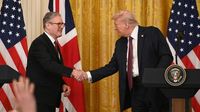On Thursday, May 8, 2025, President Donald Trump announced a tentative trade deal with the United Kingdom, marking a significant moment on the 80th anniversary of World War II Victory Day in Europe. Both Trump and British Prime Minister Keir Starmer hailed the agreement as "historic," though many details remain unclear.
During a phone call with Starmer, which was open to reporters, Trump stated, "Today’s agreement with the U.K. is the first in a series of agreements on trade that my administration has been negotiating over the past four weeks." He emphasized that the deal signifies a commitment to reciprocity and fairness in international trade.
The agreement includes a general 10% import tax that Trump had recently imposed on goods from Britain and other countries, which will remain in effect. However, it also promises to reduce or eliminate certain tariffs on British exports such as steel, aluminum, and automobiles. Specifically, the first 100,000 vehicles that U.K. car manufacturers export to the U.S. each year will benefit from a reduced tariff of 10%. Any vehicles beyond that quota will be taxed at the higher rate of 25%.
In exchange, the U.K. has agreed to allow more American goods, particularly agricultural products like beef and ethanol, into its market. According to White House officials, this deal could potentially boost U.S. exports by $5 billion, making it easier and more profitable for American farmers and food producers to sell their products in the U.K.
Starmer echoed the sentiment of economic security being tied to national security, stating, "On national security, we’ve been absolutely the closest of allies for so many years, keeping the peace through that close alliance, that friendship. Now we add to that this deal on trade and the economy." The trade relationship between the United States and the U.K. is valued at $148 billion in 2024.
However, while the announcement was met with optimism, some analysts caution that the deal may not be as expansive as it appears. Critics have pointed out that the baseline reciprocal tariffs will remain at 10% for the U.K., and the reduction on British cars only applies to the first 100,000 units shipped to the U.S. Every additional vehicle will still incur a 25% tariff.
Additionally, the U.K. has yet to agree to some of the more controversial American proposals, such as the importation of chlorinated chicken and beef fed with hormones, which have raised health concerns in Britain.
Lord Peter Mandelson, the U.K. ambassador to the United States, accompanied Trump during the announcement and even humorously suggested that Trump should buy a Rolls Royce, similar to his previous purchase of a Tesla from Elon Musk at the White House. However, Mandelson also tempered expectations, remarking, "For us it's not the end, it's just the end of the beginning."
This trade agreement comes at a time when Trump is under pressure to show progress in his global trade strategy. Polling indicates that voters are increasingly dissatisfied with his economic performance. Many Americans believe that Trump bears responsibility for economic challenges, and his approval ratings regarding the economy have declined.
Furthermore, concerns persist about the impact of tariffs on everyday consumers. A recent survey by the Federal Reserve Bank of Dallas found that a majority of Texas business leaders believe they will need to pass increased costs onto consumers. Trump himself acknowledged this issue, stating, "Oftentimes the country picks them up. Oftentimes the company picks it up. The people don't pick it up."
Additionally, Trump reignited his feud with Federal Reserve Chairman Jerome Powell, who announced on May 7 that interest rates would remain unchanged. Trump criticized Powell, saying, "He's not in love with me," reflecting ongoing tensions between the White House and the Federal Reserve.
Despite the announcement of the U.K. deal, many observers remain skeptical about its significance. Some analysts argue that it serves more as a political maneuver for Trump to save face rather than a substantial breakthrough in trade relations. Trump’s administration initially promised to negotiate 90 deals in 90 days, a goal that has now been scaled back to 75 deals, with the White House noting that it has only been in discussions with 34 countries.
Looking ahead, trade officials from the United States and China are set to begin talks in Switzerland over the weekend of May 10-11, 2025. Trump has expressed a desire to lower the steep 145% tariffs currently imposed on China, but progress remains uncertain.
As Trump navigates these complex trade negotiations, the recent agreement with the U.K. could be seen as a stepping stone, albeit a modest one, in his broader strategy. The road ahead is fraught with challenges, and the effectiveness of this deal in addressing the concerns of American consumers and farmers remains to be seen.




